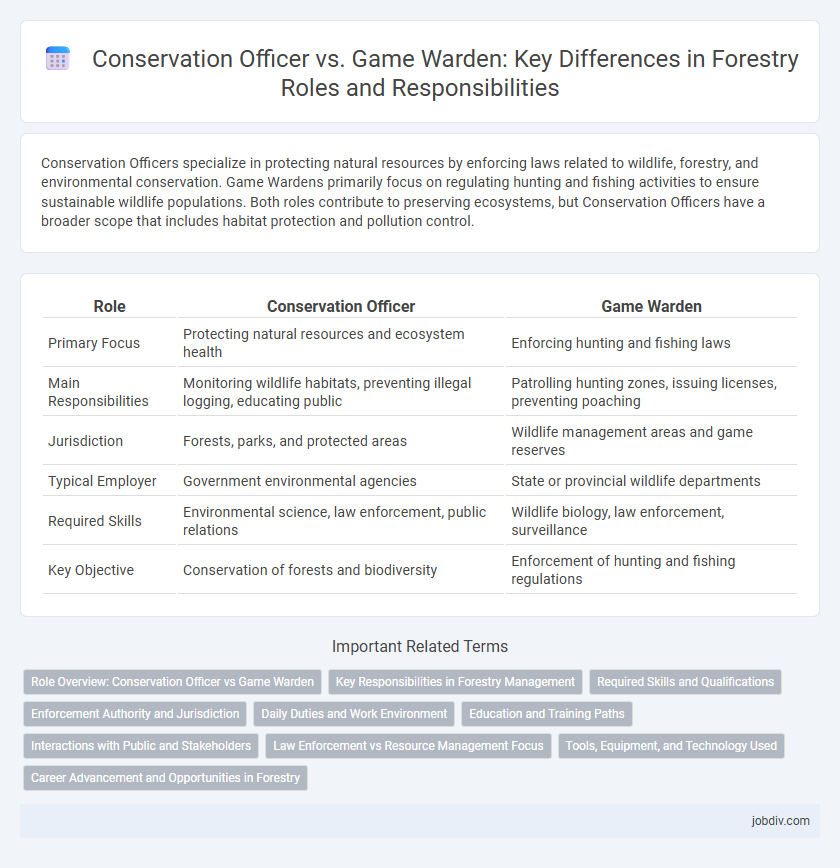Conservation Officers specialize in protecting natural resources by enforcing laws related to wildlife, forestry, and environmental conservation. Game Wardens primarily focus on regulating hunting and fishing activities to ensure sustainable wildlife populations. Both roles contribute to preserving ecosystems, but Conservation Officers have a broader scope that includes habitat protection and pollution control.
Table of Comparison
| Role | Conservation Officer | Game Warden |
|---|---|---|
| Primary Focus | Protecting natural resources and ecosystem health | Enforcing hunting and fishing laws |
| Main Responsibilities | Monitoring wildlife habitats, preventing illegal logging, educating public | Patrolling hunting zones, issuing licenses, preventing poaching |
| Jurisdiction | Forests, parks, and protected areas | Wildlife management areas and game reserves |
| Typical Employer | Government environmental agencies | State or provincial wildlife departments |
| Required Skills | Environmental science, law enforcement, public relations | Wildlife biology, law enforcement, surveillance |
| Key Objective | Conservation of forests and biodiversity | Enforcement of hunting and fishing regulations |
Role Overview: Conservation Officer vs Game Warden
Conservation Officers enforce laws protecting natural resources, focusing on preventing illegal activities like poaching, habitat destruction, and pollution. Game Wardens primarily regulate hunting and fishing activities, ensuring compliance with wildlife regulations and managing game populations. Both roles overlap in wildlife protection, but Conservation Officers have broader environmental enforcement responsibilities.
Key Responsibilities in Forestry Management
Conservation Officers enforce laws related to wildlife protection, habitat preservation, and natural resource management, often focusing on preventing illegal activities such as poaching and pollution within forestry areas. Game Wardens specifically monitor hunting regulations, ensuring sustainable game populations by enforcing seasonal and bag limits in forested environments. Both roles collaborate to maintain ecological balance and promote compliance with forestry conservation policies.
Required Skills and Qualifications
Conservation Officers require strong knowledge of environmental laws, wildlife management, and enforcement techniques, often holding degrees in natural resource management or environmental science. Game Wardens need expertise in law enforcement, hunting regulations, and wildlife biology, typically requiring law enforcement certification and specialized training in wildlife protection. Both roles demand physical fitness, excellent communication skills, and the ability to work independently in diverse outdoor conditions.
Enforcement Authority and Jurisdiction
Conservation officers possess broad enforcement authority across various natural resource laws, including forestry, wildlife, and environmental regulations, allowing them to operate statewide or regionally. Game wardens primarily focus on wildlife-related laws, such as hunting and fishing regulations, with jurisdiction often limited to specific game areas or wildlife habitats. Both roles collaborate but differ in enforcement scope, with conservation officers overseeing comprehensive resource protection while game wardens specialize in game law enforcement.
Daily Duties and Work Environment
Conservation Officers primarily enforce wildlife protection laws and educate the public on environmental stewardship, working in diverse habitats like forests, wetlands, and parks. Game Wardens focus on regulating hunting, fishing, and trapping activities, often patrolling rural and wilderness areas to ensure compliance with game laws. Both roles involve outdoor fieldwork, including surveillance, rescue operations, and reporting violations, but Conservation Officers may engage more in habitat conservation projects.
Education and Training Paths
Conservation Officers typically require a bachelor's degree in natural resource management, wildlife biology, or environmental science, supplemented by specialized law enforcement training. Game Wardens often possess similar educational backgrounds but focus extensively on certification programs in wildlife enforcement and hunter education. Both roles mandate ongoing professional development and state-specific licensing to effectively manage and protect forest ecosystems and wildlife populations.
Interactions with Public and Stakeholders
Conservation Officers engage with the public through educational programs and enforcement of environmental regulations, fostering community support for habitat preservation. Game Wardens primarily interact with hunters and anglers, ensuring compliance with hunting laws while promoting sustainable wildlife management. Both roles collaborate with stakeholders such as government agencies, NGOs, and local communities to balance conservation goals with public use.
Law Enforcement vs Resource Management Focus
Conservation officers primarily enforce environmental laws and regulations, ensuring compliance to protect natural habitats and wildlife populations. Game wardens concentrate on managing wildlife resources by monitoring animal populations, habitats, and hunting activities to promote sustainable ecosystems. Both roles collaborate to balance law enforcement with effective resource management within forestry and conservation areas.
Tools, Equipment, and Technology Used
Conservation officers utilize advanced GPS mapping systems, drones, and wildlife tracking collars to monitor ecosystems and enforce environmental regulations. Game wardens primarily rely on firearms, binoculars, and ATVs for patrolling hunting areas and managing game populations. Both roles increasingly incorporate digital databases and mobile apps for reporting violations and managing permits in forestry and wildlife conservation efforts.
Career Advancement and Opportunities in Forestry
Conservation Officers typically have broader roles encompassing wildlife protection, law enforcement, and habitat preservation, offering diverse career advancement opportunities into supervisory or specialized roles within forestry agencies. Game Wardens focus primarily on enforcing hunting and fishing regulations, with career growth often centered around field leadership or wildlife management positions. Both career paths provide strong opportunities for professional development, but Conservation Officers may have greater access to interdisciplinary forestry projects and administrative roles.
Conservation Officer vs Game Warden Infographic

 jobdiv.com
jobdiv.com